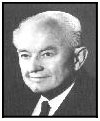Ernest Shurtleff
Holmes
Dr. Ernest Holmes (1887-1960) was the founder of a movement known as Religious Science, also known as "Science of Mind," a part of the New Thought movement. He is well known as the author of "The Science of Mind" and numerous other metaphysical books. His influence beyond New Thought can be seen in the self-help movement. Holmes was raised on a small farm near Lincoln, Maine. From 1908 to 1910, working in a store to pay his way, he attended the Leland Powers School of Expression, an acting and public speaking academy in Boston, MA. It was at the Leland Powers School that he became interested in the teachings of Christian Science, the concept of healing through prayer and the New Thought movement. In 1912 he moved Los Angeles, California where his brother Fenwick had previously established a small church, a mission of New Thought ideas. He worked as a purchasing agent for the city of Venice, and in his free time continued his study of metaphysics. It was in New York that he studied spiritual healing under Emma Curtis Hopkins, a writer and former member of the Christian Science faith and began lecturing on metaphysics in 1915. He quickly attracted a following and went on to develop his own approach to healing through mind and spirit. He published his first book, "Creative Mind," in 1919, and in 1926, he published his classic work, "The Science of Mind", at which point he established the Institute of Religious Science. A revised version of The Science of Mind was issued in 1938. Holmes went on to write numerous books of theology, influenced by not only Emma Curtis Hopkins but also by Phineas Quimby, Thomas Troward, Ralph Waldo Emerson and the texts of world religions. In 1949, he began to host what was to become a popular weekly radio program, "This Thing Called Life". He began each broadcast with the words: "There is a power for good in the universe greater than you are and you can use it." Religious Science, like many New Thought faiths, emphasizes positive thinking, influence of circumstances through mental processes, recognition of a creative energy source and natural law (Universal Intelligence, God, Spirit or First Principle) that manifests as the physical universe, and the rejection of a good/evil duality. Holmes' approach tended to focus less on defining a cosmology than other New Thought movements such as the Unity Church. Holmes denied any "special revelation", contending that Religious Science was not the "only way", but instead a "good way." Holmes did not believe in reincarnation or magic, however, Religious Science neither endorses nor rejects any particular theory or concept of reincarnation. Holmes taught Spiritual Mind Treatment, a type of scientific prayer. He taught that there is a natural law, and we can use it; and that we create our experience of reality with our thinking. Holmes’s intention was never to create a new church, but his students wanted a more organized group.
z
|
